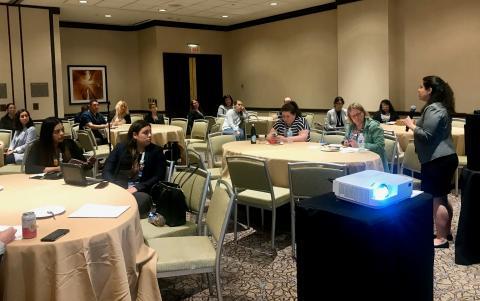Rapid response in Dallas
Motivated by the love and teachings of Jesus Christ, Catholic Charities of Dallas serves, advocates for and empowers people in need regardless of race, religion, age, gender or national origin; it also calls the community to action. The Immigration Legal Services program was established in 1975 in response to the growing number of immigrants moving to the North Texas area. Our staff are committed to help community members understand immigration law and know their rights under the law. The program provides a broad range of immigration counseling and representation to immigrants and their families, from family petitions, assistance to victims of crime, citizenship, community education and resources, and removal representation.
Dallas has a large immigrant community. One in four residents of Dallas are immigrants, and the immigrant population increased 7.2% between 2011 and 2016.1 Dallas is known to have access to many immigration nonprofit organizations working to help meet the legal needs of immigrants — including Catholic Charities of Dallas Immigration Legal Services, RAICES, Human Rights Initiative of North Texas, among others. During the past several years, changes in immigration policy and the increased number of unaccompanied minors coming to the United States prompted us to expand our collaborations to meet the growing needs of the community. These efforts were helpful, yet not permanent or ongoing. After the 2016 elections, fear and anxiety increased among local families, and these collaborations with key organizations grew. As a collective, our goal was to create a strategic network to share resources with the community, provide “know your rights” presentations and link people with the resources they needed. This is how Force for Immigrant Rights and Empowerment, or FIRE, was born as both a resource and a rapid response coalition.
On April 3, 2019, an immigration raid at a tech company in Allen, TX resulted in 284 people being detained and processed by Immigration and Customs Enforcement, or ICE, which negatively affected many Dallas / Fort Worth families. Immediately after this occurred, our community responded. Nonprofit organizations, churches, local groups and coalitions came together to educate, prepare and empower those in need. People showed up to the raid site to ensure people were not being mistreated; others hosted vigils and shared information via social media from the ICE detention center; nonprofit organizations offered free screenings to those who were released by ICE to find permanent relief, if available. These swift and meaningful responses were possible because we had a group dedicated to rapid response situations like these. The Dallas-based FIRE had certainly been preparing to help in times of need.
During 2019 Convening, Attorney Tania Guerrero hosted a brown bag session to discuss a rapid response toolkit CLINIC had been creating to help communities stay organized, prepared and educated in case of an emergency. Guerrero aimed to foster dialogue and encourage feedback to develop a tool that would be effective and meaningful. We discussed the different needs of each community, and how we can work together to better prepare those who need our services and train those who can help.
“Learning from past experiences and from others who, like Nubia, have been first responders for their communities brought unique insight to the development of a rapid response team and what to consider when building one,” said Guerrero. “A toolkit like this one is meant to inspire us to come together and reminds ourselves we are not alone; as a community, we are stronger when we are united.”
Every day, we see increased ICE activity in cities all around the country — emphasizing the need for a rapid response plan for local groups. Our work as immigrant advocates has changed in the last couple of years to focus more on the education, training and preparedness aspect of immigration justice. Being ready and educated about our rights strengthens our communities.
We believe work with vulnerable populations must be done at different levels and in different ways — and that we all can contribute with different talents. In the Dallas area, we have been working in three different initiatives to prepare for emergency situations, like the ICE raid this past April. The first is our rapid response group, FIRE. This coalition was designed to be the first line of response for emergency situations like workplace raids and ICE sightings. It is also intended as a source of reliable information on social media, to prevent the spread of unnecessary fear among immigrant families. FIRE has provided the necessary strategy to train volunteers, bring groups together to respond and offer resources in cases of emergency.
The second is the Dallas Responds group, a group of mostly religious organizations, of all faiths, that have come together to receive migrants released from El Paso-based detention centers. Thanks to team efforts, we were able to receive around 60 migrant families in Dallas. We provided food, medical services, legal immigration services, transportation and housing during their transition period, as they prepared to move to their final destinations. Since then, we have continued to train our faith groups and community members to know how to respond to emergency situations and have collected resources to use in these cases. Finally, we have partnered with the two biggest immigration nonprofits in Dallas, as well as the Dallas Hispanic Bar Association, to train and prepare non-immigration attorneys to assist with asylum and bond hearings for people without representation — and give them a better chance to obtain relief.
Calling community to action requires all of us to work together to help vulnerable groups. We can strengthen and secure our community in times of anxiety and fear by being prepared, trained, educated and available to those who need us the most.
1. New Americans in Dallas, New American Economy. https://research.newamericaneconomy.org/report/new-americans-in-dallas/ February 28, 2018






